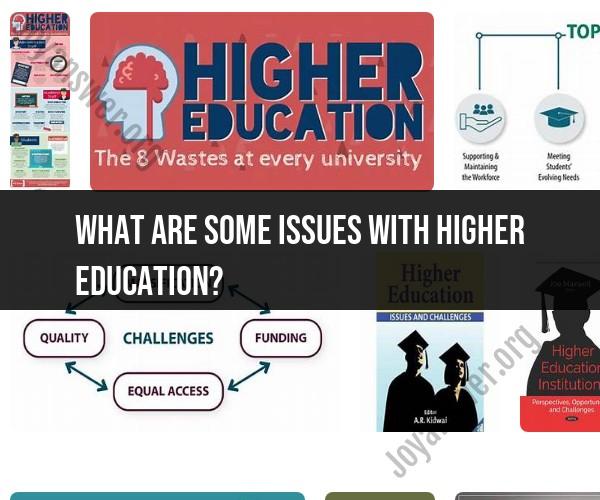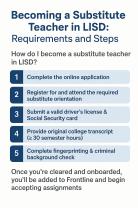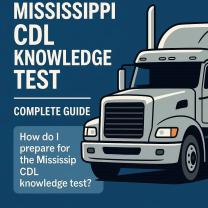What are some issues with higher education?
Higher education faces several challenges and concerns that impact institutions, students, and society as a whole. These issues vary by region and country, but some common challenges include:
Rising Costs and Student Debt:
- The cost of higher education has been steadily increasing, leading to rising student loan debt burdens.
- Many students and graduates struggle to repay loans, which can hinder financial stability and limit career choices.
Access and Equity:
- Access to higher education remains unequal, with disparities based on socioeconomic background, race, and geography.
- Ensuring equitable opportunities for all students is a significant challenge.
Quality and Accountability:
- Maintaining high academic standards while accommodating a diverse student population is challenging.
- Ensuring that graduates are adequately prepared for the workforce is a concern for employers and educators alike.
Technology Integration:
- The rapid advancement of technology requires universities to adapt their teaching methods and infrastructure.
- Online learning, digital resources, and cybersecurity are areas of concern and innovation.
Curriculum Relevance:
- Keeping curricula up-to-date and relevant to the needs of the job market is a challenge.
- Preparing students for careers in rapidly changing fields is crucial.
Faculty Workload and Compensation:
- Faculty members often face heavy workloads, including teaching, research, and administrative responsibilities.
- Concerns about faculty compensation, job security, and work-life balance persist.
Student Mental Health:
- Increasing awareness of mental health issues on campuses has prompted calls for better support services.
- Stress, anxiety, and depression can affect students' academic performance and well-being.
Diversity and Inclusion:
- Campuses are working to foster inclusive environments where students from diverse backgrounds feel welcome and supported.
- Addressing issues of discrimination and bias is an ongoing process.
Governance and Funding:
- Funding challenges, particularly during economic downturns, can impact program offerings and the quality of education.
- Ensuring stable financial support for universities is crucial.
Globalization and Internationalization:
- Higher education institutions are increasingly engaged in global partnerships and collaboration.
- Managing internationalization efforts while maintaining academic integrity can be complex.
Student Success and Completion:
- Ensuring that students complete their degrees in a timely manner is a priority.
- Support for at-risk students and strategies to reduce dropout rates are ongoing concerns.
Free Speech and Academic Freedom:
- Balancing free speech rights with the need for respectful and inclusive campus environments can be challenging.
- Protecting academic freedom while addressing controversial issues is a complex issue.
These are just some of the many issues facing higher education today. Institutions and policymakers continue to work on addressing these challenges to improve the quality, accessibility, and relevance of higher education for students and society.
Challenges and Concerns in Higher Education
Higher education is facing a number of challenges and concerns today. Some of the most pressing issues include:
- Rising costs: The cost of college tuition has been rising steadily for decades, making it increasingly difficult for students to afford a higher education.
- Student debt: Student loan debt is at an all-time high, and many graduates are struggling to repay their loans.
- Declining enrollment: In recent years, there has been a decline in the number of students enrolling in college. This is due to a number of factors, including the rising cost of college and the growing availability of alternative education and training programs.
- Equity and access: Not all students have equal access to higher education. Students from low-income families and minority groups are less likely to attend college than students from high-income families and white students.
- Quality and outcomes: There is growing concern about the quality of higher education and the outcomes that students are achieving. Some graduates are finding that their skills and knowledge are not well-matched to the needs of the workforce.
Identifying Key Issues Impacting Higher Education Today
In addition to the challenges listed above, there are a number of other key issues impacting higher education today, including:
- The COVID-19 pandemic: The COVID-19 pandemic has had a significant impact on higher education. Many colleges and universities were forced to close their campuses and transition to online learning. This has disrupted the learning process for many students and has created financial challenges for many institutions.
- The changing workforce: The workforce is changing rapidly, and colleges and universities need to adapt their programs to meet the needs of the future workforce. This means focusing on developing skills in critical thinking, problem-solving, and collaboration.
- The rise of technology: Technology is playing an increasingly important role in higher education. Colleges and universities are using technology to deliver instruction, assess student learning, and manage their operations. However, it is important to ensure that all students have access to the technology they need to succeed.
Addressing Problems and Solutions in the Higher Education Sector
There are a number of things that can be done to address the challenges and concerns facing higher education today. Some possible solutions include:
- Making college more affordable: There are a number of ways to make college more affordable, such as increasing Pell Grants, providing more scholarships, and making college tuition tax-deductible.
- Helping students repay their debt: The government could offer more income-based repayment plans and loan forgiveness programs for students who work in public service jobs.
- Improving access to higher education: Colleges and universities could offer more dual enrollment programs, which allow high school students to take college courses while they are still in high school. They could also offer more flexible learning options, such as online and evening courses.
- Ensuring quality and outcomes: Colleges and universities could be held more accountable for the quality of their programs and the outcomes that their students achieve. This could be done through performance-based funding and other measures.
Addressing the challenges and concerns facing higher education is a complex task, but it is essential to ensuring that all students have access to a high-quality education.












